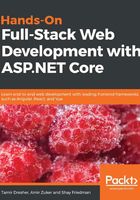
React
React, released and managed by Facebook, is a JavaScript SPA framework focusing on components, serving the purpose of a view engine. Contrary to Angular, React is less opinionated on how you build an entire app and requires a milder learning curve, albeit it's just a view engine. React enables building encapsulated and reusable components using its notorious and controversial JSX, a domain-specific language (DSL) that allows you to write the view of the component in JavaScript alongside the component logical code.
React was released to the public in 2013 and it has made a great impact in the field, introducing great concepts to web apps, such as JSX, Virtual DOM, unidirectional data flow and great performance.
Notably, React is not just for web apps. React follows the notion of Learn-Once-Write-Everywhere. Meaning, you can leverage React to write apps that target different platforms, for example using React Native for cross-platform native mobile apps and React360 for VR.
Moreover, the innovation and collaboration around React is astonishing and its community is paramount. React is just a component library, thus enthusiast followers have created complementary libraries to provide other aspects related to app development, such as state management, routing, and isomorphic rendering. Some of which have too made a noticeable influence in the field as well, for example, Flux and Redux.
Ever since its release, React has been gaining popularity at a steady pace, taking its place as the leading SPA framework for quite some time now.